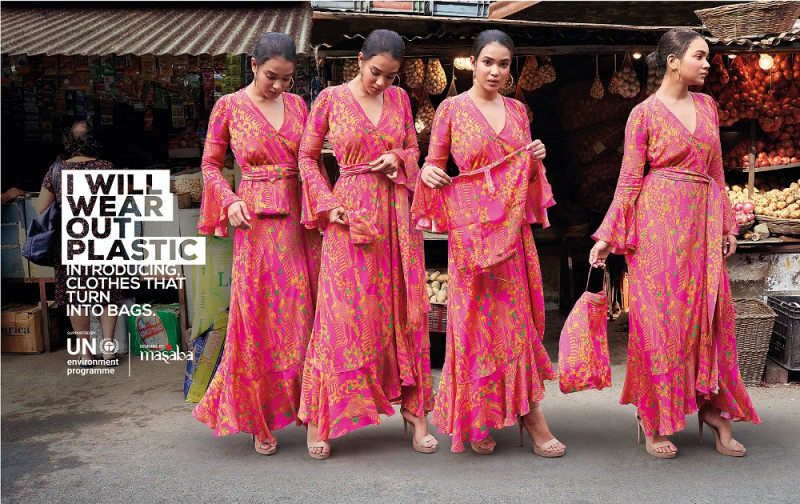The United Nations Environment Program (UNEP) India office has launched a campaign to showcase and propagate its work on phasing out single-use plastic. While well-known fashion designer Masaba Gupta lends her haute couture expertise to the initiative, Ogilvy brings to life the campaign’s creative interpretation.
The clothing line, developed by Masaba, seeks to entrench the message hash-tagged as #IWillWearOutPlastic.
UNEP India has closely collaborated with the Government of India’s campaign against single-use plastic ever since #BeatPlasticPollution was launched on World Environment Day 2018 in alliance with the Ministry of Environment, Forest, and Climate Change.
The clothing collection, which was launched by Masaba in Mumbai on 22 January 2020 along with UNEP and Ogilvy, seeks to lessen the use of plastic bags creatively and will be available in stores and online. Each garment is paired with an exclusive accessory, which is a detachable, reusable bag that can be used fashionably (see the video).
Speaking on the occasion, Atul Bagai, Country Head, UNEP India, said: “Addressing environmental challenges such as plastic pollution call for behavioural changes in society and it can have a huge impact when an acclaimed fashion designer like Masaba Gupta makes an environment statement through an entire clothing line. We look forward to the success of this innovative idea and thank Masaba Gupta and Ogilvy for associating with us.”
Referring to the philosophy behind the initiative, Masaba said: “This is not just a collaboration, it’s a war cry. This is House of Masaba’s way of giving back to the environment. It’s the need of the hour and we are taking that conscious step towards sustainability, because the global environmental crisis is all too visible now. Plastic pollution is one of the largest environmental threats faced globally and there’s an urgent requirement and responsibility to address it. The fashion industry is also known to produce the most global wastage. This time, we’re using fashion as a tool for empowerment and activism. We encourage people to understand our concept and try to recreate their own permutations and combinations to take this concept forward.”
NO BLANKET BAN:
Although Prime Minister Narendra Modi had announced the ban on single-use plastic on the occasion of Gandhi Jayanti on 2 October 2019, the government postponed imposing a blanket ban on single-use plastics to combat pollution as it was seen as being potentially disruptive for industry, particularly in the midst of economic slowdown and job losses.
A study by FICCI (Federation of Indian Chambers of Commerce & Industry) had observed that an outright ban on single-use plastics would have “multi-factoral effects” on industry as it would raise the price of most FMCG products with manufacturers forced to look for alternative packaging.
The study further said a ban would wipe out low-price products packed in plastic, such as those that cost less than Rs. 5 like shampoo sachets, detergent pouches, and biscuit packets etc as production at those price points could be rendered unviable, especially in the rural markets.
The FICCI study also said the Rs. 53,000-crore worth plastic manufacturing industry could be adversely hit by the ban. Close to 1.5 million workers in 10,000 firms could lose their jobs while the food-processing industry could suffer from a revenue loss of Rs. 90,000 crore.


Plastic was invented by John Wesley Hyatt, an American inventor, in 1869, who simplified the production of celluloid, the first industrial plastic.
Plastic waste today is at “epidemic proportions” in the world’s seas and oceans with an estimated 100 million tonnes dumped till date, says the United Nations.







